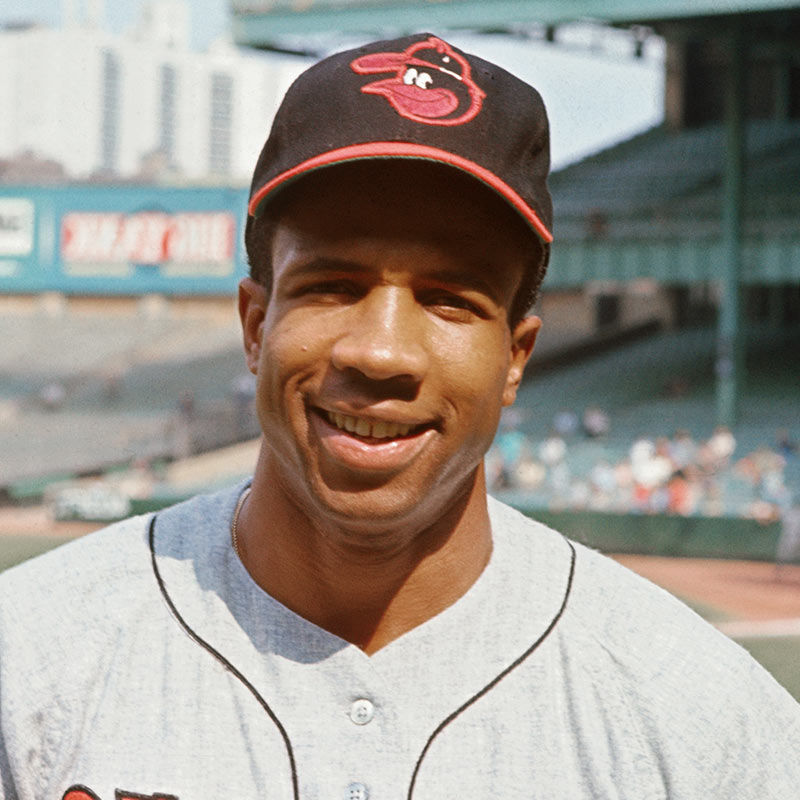On the 25th anniversary of Jackie Robinson’s breaking Major League Baseball’s color barrier, he famously said, “I’m going to be tremendously more pleased and more proud when I look at that third base coaching line one day and see a black face managing in baseball.”
In 1975, his wish came true when Frank Robinson became baseball’s first black manager.
While reading up on Frank, who died on February 7, I realized that this legendary and under-appreciated baseball icon is deserving of more respect than he ever received. He may even be the most underrated player in history.
Blazing a Trail for Coaches of Color
Back in the 70s, there weren’t many coaches of color in professional sports- not even in the NBA. In fact, the 1975 NBA Finals were the first in which the head coach of each team was black. And that hasn’t happened in the NBA since, unless you count the 2017 Finals between acting head coach/assistant Mike Brown and Tyronn Lue.
Al Attles, who coached the ‘75 Golden State Warriors said, “You have to give credit to the people who hired you… [hiring a black coach] wasn’t something that was done every day back then.” True statement. It was an unpopular, yet bold move for a white executive to hire an ethnic minority head coach.
Although the NFL’s first black head coach was Fritz Pollard in the 1920s, the second wouldn’t come along until Art Shell in 1989.
Robinson’s becoming the first black manager in Major League Baseball was a big deal, especially when 71 percent of the players and one-hundred percent of the owners were white. Though it was far from glorious. He was hired as a player-manager, with a player’s salary, on a one-year contract. But he wasn’t in it for the money. “Somebody had to open that door; barriers need to be addressed,” he said to sports reporter Steve Jacobson in a book titled Carrying Jackie’s Torch.
A manager has to earn the trust of his players, general manager, and the owners to keep his job. I can only imagine how much more difficult it was for Robinson, as he had more to think about than wins and losses. He and his wife received death threats while managing the Cleveland Indians and later the San Francisco Giants. And Ted Bonda, who hired the first black manager, said “anything that went wrong was blamed on the fact that he was black.” This was the price Robinson had to pay for proving that he was as capable as a white man in managing a team.
Robinson’s Heroics
As a player, Robinson starred for five different teams from 1956 to 1976. He was the National League Rookie of the Year, a 14-time All-Star, won two World Series, and is the only player to win an MVP award in both the American and National leagues. He was inducted into the National Baseball Hall of Fame in 1982.
During a 1966 game while Robinson was playing for the Baltimore Orioles, he hit a home run completely out of Memorial Stadium. The ball was hit 541 feet, and was the only ball ever hit completely outside of the stadium.
Robinson’s goal was to be hired as the first major league manager, and he got his chance when the Indians named him player-manager for the ‘75 season. Hall of Fame pitcher Gaylord Perry, who was the Tribe’s opening day starter, doubted Robinson’s ability to manage.
Meanwhile, Robinson inserted himself as the starting designated hitter. On his first at bat, he hit a home run to help Perry and the Indians to a win.
In 1981, Robinson was hired to manage the San Francisco Giants, becoming the first black manager in the National League.
Though he had an overall losing record as a manager, it should be noted that he helped the 1989 Orioles and 2002-03 Montreal Expos rebound from losing seasons. After the ‘89 season, he earned the American League Manager of the Year Award.
Robinson’s Legacy
Robinson, undoubtedly one of baseball’s most iconic figures, has sadly gone unrecognized in recent years. In 2005, while managing the Washington Nationals, one of his own players asked him if he’d ever played in the major leagues. That would be similar to asking Spike Lee if he knows anything about movies.
Though Robinson felt disappointed that the world didn’t recognize his accomplishments, he was more concerned about equal opportunities for other African Americans. “We will have gone full circle,” he said, “when a black person is hired to manage a ball club and there’s no reference to his color. We’re not even close to where we should be.”
He lived with the reality that he wasn’t regarded as a hero according to most people, though he dared to blaze a trail for ethnic minorities in a primarily white sport. In doing that, Robinson set an example of doing the right thing — in his case fighting for equality — without seeking personal fame.
Frank Robinson reminds me of Moses of the Bible. Moses was chosen by God to lead his people out of slavery in Egypt. With God’s help, he led his people out of Egypt and into a new land where the nation of Israel settled. It wasn’t long, however, until the people complained about Moses and said they were better off in Egypt!
Like Moses, Robinson rose paved the way for men of color to be major league baseball managers. He heroically became the first, breaking down the belief that non-white men couldn’t be managers. Like Moses, Robinson was unappreciated thirty years later while managing the Nationals. And like Moses, Robinson remained faithful to his calling and didn’t quit.
Our Response
Only 16 other African Americans have been hired as full-time managers since Robinson bravely broke the managing color barrier 44 years ago. Several, like Gary Jones, have paid their dues as minor league managers without receiving callbacks for major league jobs.
To honor the lives of Frank Robinson and Jackie Robinson is to advocate for equal opportunity for people of color in leadership positions.
Shouldn’t we — whether or not we are the ones being discriminated against — advocate for what is right in God’s eyes? We know what is right when we follow God closely, and we know how to lead when we obey the One who leads us.
Frank has passed, but his legacy lives. Perhaps American culture will finally give him the credit he deserves.













